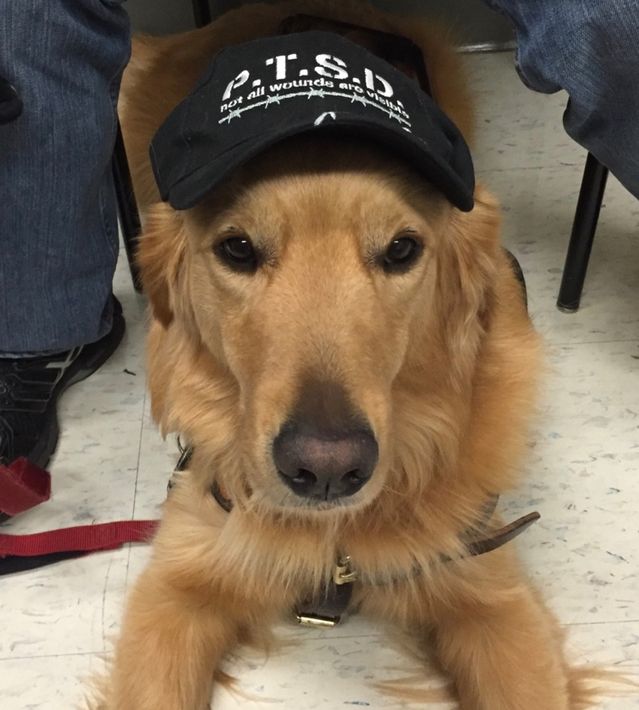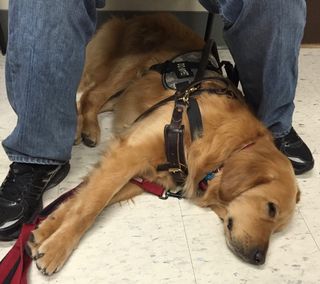Post-Traumatic Stress Disorder
You CAN Teach an Old Dog New Tricks
Man's best friend can help with PTSD treatment
Posted May 3, 2016

I am the old dog.
My publisher, Elsevier, recently launched the latest book I edited, Principles and Practice of Sleep Medicine. I learned a lesson recently that did not make it into the book. Here’s the story.
It was a busy clinic day, and the patient was a veteran in his late 40’s. He was wearing extremely dark sunglasses, and he had a beautiful Golden Retriever on a harness. This isn’t something you see in the clinic every day, and I assumed, as it turned out quite incorrectly, that the veteran was blind and that the dog was a Seeing Eye dog.
When I started to chat with the veteran in the exam room, I could not see his eyes because his glasses were so dark. While we were speaking, the dog lay down under the chair and seemed to be asleep.

It soon became clear that the veteran was not blind, and it was not a Seeing Eye dog, but a dog that he had obtained to treat his Post Traumatic Stress Disorder. The veteran had severe Post Traumatic Stress, with distressing nightmares of floating body parts. These nightmares replayed events that occurred when he was stationed in Croatia. One of his duties there was to exhume bodies from a cemetery, and he could not forget the images of decomposed body parts. His sleep and dreams would not let him forget those images.
So here it is, more than 10 years later, when the veteran has a nightmare and is distressed, the dog jumps on his bed, licks him in the face and calms him down. This works much better for this veteran than medications. The dog, “Sleepy” (not the real name, to protect the dog’s confidentiality), seemed to be able to read the veteran’s mind during the daytime and his dreams at night. As soon as the veteran stood up to leave the exam room, the dog sprang to its feet and was ready to do its work.
In a previous blog, I wrote about the devastating effect of PTSD on patients’ sleep and lives. Treatment of PTSD is very far from perfect and currently consists usually of psychiatric medications and cognitive behavioral therapy. Many patients, too, have been helped by service dogs.
Although it would be reasonable to assume that veterans had been provided service dogs for treatment for PTSD, this has not been the case until very recently. Service dogs were provided to “veterans with visual, hearing, or substantial mobility impairments,” but not for mental illnesses or PTSD. (1) We lack definitive research showing that having service dogs is indeed beneficial. A large research project called PAWS is studying the impact of service dogs on PTSD. So far the results suggest that therapy dogs are helpful. Patients with service dogs had statistically significant improvements in scores of depression and PTSD symptoms. The final results are forthcoming. (2)
There is good news. On March 16, 2016, U.S. Rep. Ron DeSantis (FL-06) and U.S Rep. Keith Rothfus (PA-12) introduced the Puppies Assisting Wounded Servicemembers (PAWS) Act that would increase availability of service dogs for vets with post-traumatic stress.
I forgot to mention why the patient was in the clinic. It wasn’t for the treatment of PTSD, which as it turned out to be reasonably well controlled now, but for sleep apnea. The patient complained that when wearing the CPAP mask to treat his Sleep Apnea he would often find that he had taken off the mask during the night. I asked whether the dog could be trained to intervene when the mask fell off and he started to snore. The veteran said, “Why not? I believe additional training will teach this dog a few more tricks.”
In medicine, one learns a great deal from the patient. In this encounter, I learned a great deal from “Sleepy.” I expect that when the next edition of my textbook comes out we will have a section on the impact of service dogs on therapy of PTSD nightmares.
Weinmeyer, R. Service Dogs for Veterans with Posttraumatic Stress Disorder. AMA Journal of Ethics. June 2015, Volume 17, Number 6 : 547-552.
http://journalofethics.ama-assn.org/2015/06/hlaw1-1506.html
Green G, Yarborough B, Scott, S. Service dogs for veterans with post-traumatic stress disorder: Findings from the PAWS Study. Presented at Annual Meeting of American Public health Association, November 4, 2015.
https://apha.confex.com/apha/143am/webprogram/Paper332060.html
Press Release. DeSantis Introduces Veteran Service Dog Legislation. http://desantis.house.gov/media-center/press-releases/desantis-introduces-veteran-service-dog-legislation


